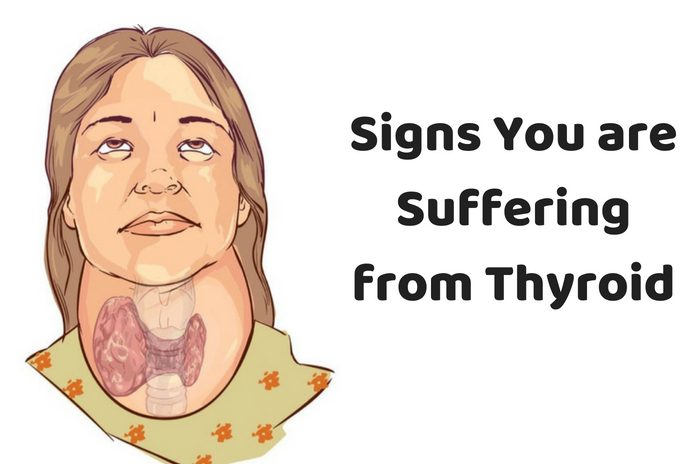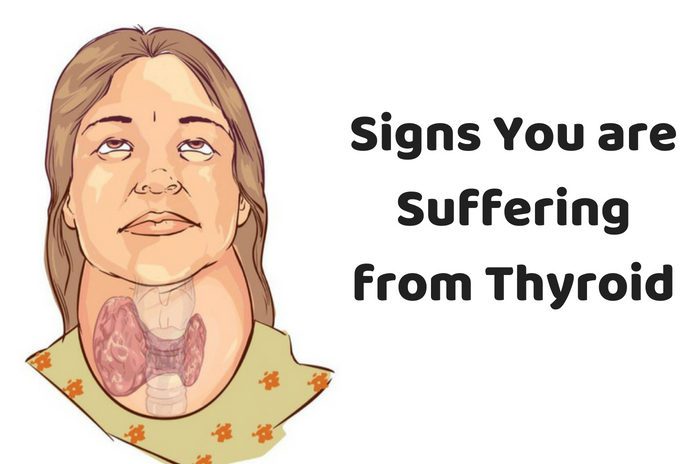Thyroid disease is caused due to conditions that cause over or under-function of the thyroid gland (metabolism hormone-producing gland in the lower part of the neck, below the Adam’s apple). When the gland produces too much thyroid hormone, the condition is known as hyperthyroidism. In case of too little thyroid hormone produced, it is known as hypothyroidism. In addition to problems, enlargement of the thyroid gland in the neck can cause symptoms that are directly related to the increase in size of the organ.

First, we will read about hyperthyroidism (overactive thyroid):
Hyperthyroidism or an overactive thyroid can be caused by Graves’ disease, inflammation of the thyroid gland (known as thyroiditis) or by tumors that secrete thyroid hormones.
Causes:
The main causes of hyperthyroidism is Graves’ disease, it is an autoimmune disorder. It causes antibodies to stimulate the thyroid to secrete too much hormone. This disease is mostly found in women than men. It also shows genetic characteristic. Other causes are: excess iodine or inflammation of the thyroid, which causes T4 and T3 to leak out of the gland, tumors of the ovaries or testes, benign tumors of the thyroid, large amounts of tetraiodothyronine taken through dietary supplements or medication.
Signs and symptoms:
1. Nervousness
2. Irritability
3. Poor concentration
4. Reduced menstrual blood flow in women
5. Racing heartbeat
6. More frequent bowel movements
7. Enlargement of the thyroid gland
8. Skin thinning
9. Increase in appetite
10. Sweating
Treatment:
• Radioactive iodine. Radioactive iodine is taken by mouth and absorbed by thyroid gland, where it causes the gland to shrink and symptoms to less severe, usually within three to six months. This treatment causes thyroid activity to slow considerably, causing the thyroid gland to be underactive (hypothyroidism), so it is important to take medication every day to replace thyroxine.
• Anti-thyroid medications. These medications reduce symptoms of hyperthyroidism by preventing thyroid gland from producing excess amounts of hormones. They include propylthiouracil and methimazole (Tapazole). Symptoms usually begin to improve in six to 12 weeks, but treatment with anti-thyroid medications typically continues at least a year and often longer. Both drugs can cause serious liver damage, sometimes leading to death. Because propylthiouracil has caused far more cases of liver damage, it generally should be used only when you cannot tolerate methimazole. A small number of people who are allergic to these drugs may develop skin rashes, hives, fever or joint pain.
• Beta blockers. These drugs are commonly used to treat high blood pressure. They won’t reduce thyroid levels, but they can reduce a rapid heart rate and help prevent palpitations. Side effects may include fatigue, headache, upset stomach, constipation or diarrhea.
• Surgery (thyroidectomy). If you’re pregnant or otherwise cannot tolerate anti-thyroid drugs and cannot have radioactive iodine therapy, then we should go for thyroid surgery. This is an option in only a few cases.
In a thyroidectomy, doctor removes most of thyroid gland. Risks of this surgery include damage to vocal cords and parathyroid glands. In addition, we also need lifelong treatment with levothyroxine (Levoxyl, Synthroid, others) to supply body with normal amounts of thyroid hormone. If parathyroid glands also are removed, then we need medication to keep blood-calcium levels normal. In case of any emergency, visit: Urgent Care Hoboken
Another type of thyroid gland is hypothyroidism:
Hypothyroidism occurs when your body doesn’t produce enough thyroid hormones.
Causes:
• Autoimmune disease. People who develop a particular inflammatory disorder known as Hashimoto’s thyroiditis have the most common cause of hypothyroidism. Autoimmune disorders occur when immune system produces antibodies that attack your own tissues. Sometimes this process involves thyroid gland.
• Treatment for hyperthyroidism. People who produce too much thyroid hormone are often treated with radioactive iodine or anti-thyroid medications to reduce and normalize their thyroid function. In some cases, treatment of hyperthyroidism can result in permanent hypothyroidism.
• Thyroid surgery. Removing all or a large portion of thyroid gland can diminish or halt hormone production. In that case, we need to take thyroid hormone for life.
• Radiation therapy. Radiation used to treat cancers of the head and neck can affect thyroid gland and may lead to hypothyroidism.
• Medications. A number of medications can contribute to hypothyroidism. One such medication is lithium, which is used to treat certain psychiatric disorders.
Signs and symptoms:
Fatigue, Increased sensitivity to cold, Constipation, Dry skin, Weight gain, Puffy face, Muscle weakness, Elevated blood cholesterol level, Muscle aches, tenderness and stiffness, Pain, stiffness or swelling in joints, Thinning hair, Slowed heart rate, Depression, Impaired memory etc.
Hypothyroidism in infants:
When newborns do have problems with hypothyroidism, the problems may include:
• Yellowing of the skin and whites of the eyes (jaundice).
• Repeatedly choking.
• A large, protruding tongue.
• A swollen appearance to the face.
In case of children and teens:
Children and teens have the same signs and symptoms as adults do, but they may also experience:
Poor growth resulting in short stature, delayed development of permanent teeth, delayed puberty, poor mental development. For more information, contact endocrine surgeon melbourne.
Treatment:
- Levothyroxine pill: The easiest and most effective treatment is simply taking a thyroid hormone pill (Levothyroxine) once a day, mainly in the morning. This medication is a pure synthetic form of T4 which is made in a laboratory to be an exact replacement for the T4 that the human thyroid gland normally secretes.
- Combination therapy: using levothyroxine and triiodothyronine (T3) together. However, this type of treatment may sometimes be recommended in cases where a person has a history of thyroid cancer.

